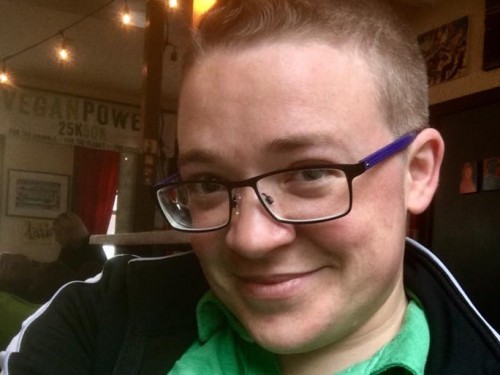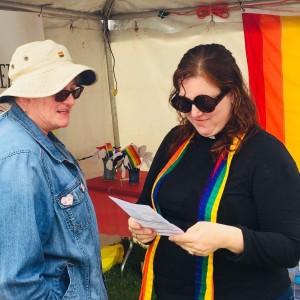Ministry of Language: Interview with Alex Kapitan
 When Meadville Lombard launched this new website, we contacted Alex Kapitan, a queer genderqueer spiritual activist, intersectional educator and organizer, and radical copyeditor, to do intentional copyediting. We asked Alex to tell us about per work and future projects.
When Meadville Lombard launched this new website, we contacted Alex Kapitan, a queer genderqueer spiritual activist, intersectional educator and organizer, and radical copyeditor, to do intentional copyediting. We asked Alex to tell us about per work and future projects.
ML: Could you please tell us how you started Radical Copyediting?
These days when people ask me, “What do you do?” or “What do you do for a living?”, I say, “Well, I’m a minister, and I’m an editor.” Which might seem a little bit strange to hear those two things going together, but I actually have always been interested in the editing and the publishing-related work—I do content development, copyediting, content editing; I love to do pretty much any part of that process—and I’ve always been interested in that work from a place of wanting to use those skills to help folks, use language and create content that can help move the world towards where we want to live in. An internship I did with South End Press was where I found that perspective and got into it. South End Press was the last remaining publishing company in this country that was collectively run by women of color. They
When I struck out on my own and decided to work for myself a couple of years ago, I launched the Radical Copyeditor website as a public ministry, as a way of trying to put out content that helps folks use language in ways that create liberation and fight oppression, because so much of our culture and the way that we view things as normal or all those norms that we have and hold—a lot of which are unconscious—are completely embedded in our language. Really, the way in which we use language says everything about our values and the world that we are trying to create and that we live in. So helping people use language in ways that are more intentional and more aligned with our best and highest values, it is something that I absolutely feel is
ML: It’s like the way our Archives say, “How we remember things, how we archive things, is a matter of social justice.”
Yes, absolutely! How do we tell the story, right? How we tell any story has everything to do with all of that, yeah, absolutely.
ML: We were very fortunate to have you go through all of our pages on our new website with your expertise. How was it for you?
It was great! I loved being able to work on the Meadville Lombard website, it was wonderful to get to read the content and learn more about—like we were talking about—the values of Meadville Lombard and what you are trying to do and how you are—again sort of like I do—trying to prepare and help leaders and other folks do ministry in many different ways in the world. Being able to see that sign through the website was really quite special; I loved being able to help that message come across.
ML: Thank you so much! Your edits made tons of difference. So, what’s next for you? What is on your horizon?
When people ask what I do, and I say I am a minister and an editor, that’s partly because I have a couple of different projects. I have the Radical Copyeditor project: I love working with people and organizations like Meadville Lombard within the Radical Copyeditor project. And I also have another project, I guess you can call it a project. Rev. Mykal Slack, LeLaina Romero, and Teo Drake and I started the Transforming Hearts Collective a couple of years ago to do transformational change work at the intersections of sexuality, gender, race, class, ability, and religion/spirituality. We see ourselves as trying to help support the creation of spaces where queer and trans people can get our spiritual needs met in everywhere that we call “home.” We are both supporting queer and trans folks in accessing spirituality in creative ways, and also working with churches and other organized religious groups to be those spaces. It’s really quite cool.
We each have a different piece of the work we do, but the thing that I’m most jazzed about right now is that we are working to create
ML: That is fantastic! Is it only for UU congregations?
No, it’s not only for UU congregations. We have an advisory team which is helping us develop a pilot program, and we are planning to pilot probably in UU
But what we encounter and experience within Unitarian Universalism is that folks have an identity, congregations have an identity being LGBTQ welcoming, which is wonderful, and have often done some really great intentional
ML: Isn’t there a saying, “anything that’s worth changing, it won’t happen in your lifetime”?
Yes, that’s right! But at the same time, it’s meaningful to stretch the boundaries of what we are working toward. If we can only imagine—and this is where language comes in again—if we can only imagine and articulate, if the most radical future, or the most liberatory future we can imagine, is the future in which the LGBTQ people are accepted in religious spaces, that’s not a big enough imagination. I am not fighting for acceptance; I’m fighting for liberation.
This reminds me of a really wonderful story from an organization in California called the Family Acceptance Project. They actually do a lot of work with Mormons, they are doing a lot of good work around LGBTQ youths and family acceptance. They were working off this model that there are three different kinds of families that a queer or trans youth could come from: they could be actively unwelcoming and violent, they could be neutral, or they could be accepting and tolerant. What they found overtime—and this is so gorgeous and beautiful—they found that they hadn’t accounted for the fourth type of family and they needed to add a fourth category, which was actively celebratory. Which was amazing!
So we are talking about the parents who are like, “Oh! You have come out to me as queer or as trans; let’s throw a party! Let’s have a renaming party, re-pronoun-ing party, and really celebrate that you have shared this deep thing with us and we are blessed with the ability to welcome and celebrate you in this way.” It never occurred to them that there was this entirely new category of families and that would have such a different experience than just a passively tolerant and accepting family. So different!
So similarly, that’s what we are trying to do in the Transforming Hearts Collective, we are trying to create spaces for that fourth category, where all of who we are is celebrated, not just
ML: That is so powerful! And you are just the right person to do this work.
It is a calling, that’s why I definitely call it ministry. Even though I’m not ordained, I consider myself a lay minister. And I’m not seeking ordination at any point in the near future, and I don’t want to make it sound like I’m the same as an ordained minister—that is a totally different call, it’s totally wonderful—but it does feel like calling, a form of ministry for sure.
ML: Well, we are here if you need a credential. And you know all about our programs.
I do! It’s been great learning about it!

Alex Kapitan
Alex Kapitan is a Radical Copyeditor, a queer genderqueer spiritual activist, and an intersectional educator and organizer. Ze endeavors to use per brilliant word powers to create positive change in the world.
Read more about Alex
